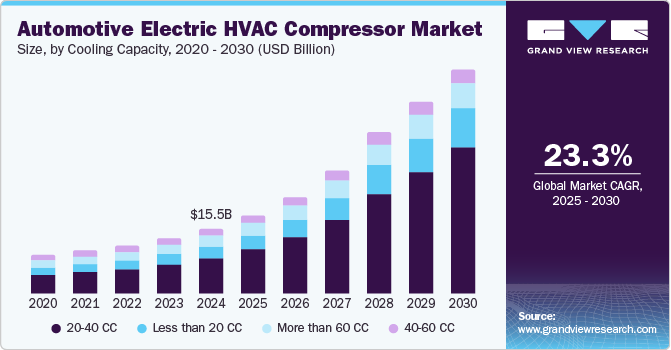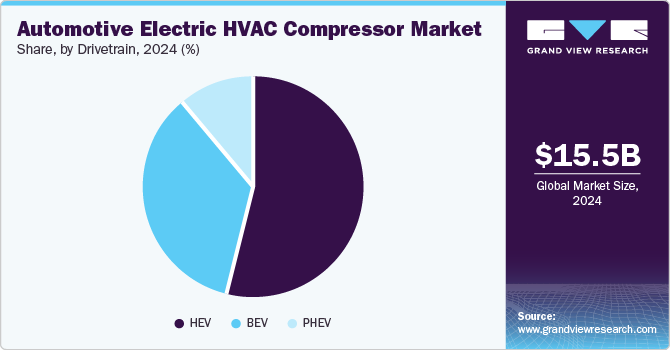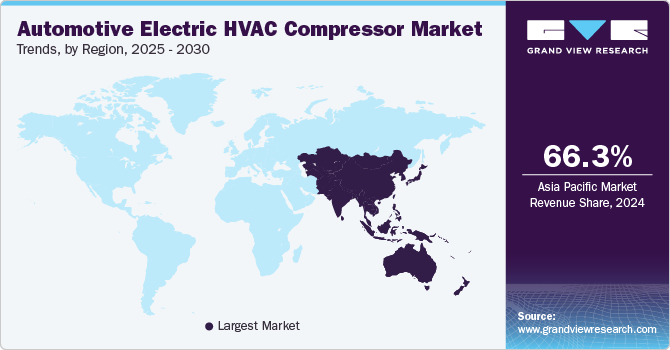- Home
- »
- Automotive & Transportation
- »
-
Automotive Electric HVAC Compressor Market Report, 2030GVR Report cover
![Automotive Electric HVAC Compressor Market Size, Share & Trends Report]()
Automotive Electric HVAC Compressor Market (2025 - 2030) Size, Share & Trends Analysis Report By Cooling Capacity, By Product (Scroll), By Vehicle, By Drivetrain (PHEV, BEV, HEV), By Region, And Segment Forecasts
- Report ID: GVR-4-68039-449-7
- Number of Report Pages: 120
- Format: PDF
- Historical Range: 2018 - 2023
- Forecast Period: 2025 - 2030
- Industry: Technology
- Report Summary
- Table of Contents
- Segmentation
- Methodology
- Download FREE Sample
-
Download Sample Report
Market Size & Trends
The global automotive electric HVAC compressor market size was valued at USD 15.46 billion in 2024 and is projected to grow at a CAGR of 23.3% from 2025 to 2030. A primary driver is the increasing adoption of electric and hybrid vehicles, which require specialized HVAC systems to manage cabin temperature effectively without relying on traditional combustion engines. Consumers are leaning toward electric vehicles as they become more environmentally conscious, boosting demand for efficient electric HVAC compressors.

Moreover, technological advancements play a crucial role in shaping the market. Innovations in battery technology and electric drivetrains have made electric vehicles more practical, enhancing consumer confidence in their reliability and efficiency. The development of smart HVAC systems, which offer improved control and connectivity, further supports the transition toward electric vehicles. As automakers focus on energy efficiency and performance optimization, the demand for advanced electric HVAC compressors is expected to rise significantly.
Furthermore, the ongoing globalization and urbanization in developing countries are expected to increase the demand for light and efficient automotive solutions. As these regions enhance their transportation infrastructure and promote electric vehicle adoption, the need for electric HVAC compressors will likely surge. Furthermore, rising fuel costs and growing awareness about ecological sustainability will encourage consumers to opt for electric vehicles, further propelling market growth.
Cooling Capacity Insights
The 20-40 CC segment dominated the market with a share of 54.7% in 2024, owing to the increasing demand for efficient cooling systems in passenger and light commercial vehicles, which require compact and effective solutions to manage cabin temperatures. The versatility of 20-40 CC compressors makes them particularly suitable for small to medium-sized vehicles, allowing manufacturers to enhance performance while maintaining energy efficiency. As automakers prioritize these features, the segment is expected to maintain its leading position.
The less than 20 CC segment is projected to grow at a significant CAGR during the forecast period, driven by the rising popularity of compact vehicles. As urbanization increases and consumers seek fuel-efficient options that are easier to maneuver in congested environments, the demand for smaller electric Heating, Ventilation, and Air Conditioning (HVAC) compressors is set to rise. These compressors are ideal for lightweight vehicles, offering effective temperature control while minimizing energy consumption. This shift toward smaller cars aligns with broader trends in sustainability and efficiency, positioning the less than 20 CC segment for robust expansion within the automotive electric HVAC compressor industry. A notable example is the growing popularity of compact SUVs such as the Hyundai Kona Electric, which utilizes advanced HVAC systems tailored for energy efficiency while maintaining cabin comfort.
Product Insights
The automotive scroll compressor is a vital component within the automotive electric HVAC compressor market, notable for its efficiency, compact design, and superior performance. Unlike traditional compressors, scroll compressors utilize a unique spiral mechanism that facilitates smooth and continuous refrigerant compression. This design results in quieter operation and significantly reduces energy consumption, making it an ideal choice for electric and hybrid vehicles where energy efficiency is paramount.
Moreover, as the demand for Electric Vehicles (EVs) continues to rise, the scroll compressor's ability to optimize climate control while minimizing power usage becomes increasingly beneficial to manufacturers. These compressors can provide consistent cooling performance across a wide range of operating conditions, ensuring passenger comfort regardless of external temperatures.
Vehicle Insights
The passenger vehicles segment dominated the market with the largest revenue share in 2024. This dominance can be attributed to consumers' growing preference for personal vehicles that offer enhanced comfort and energy efficiency. As automakers innovate and expand their electric vehicle offerings, the demand for advanced HVAC systems tailored specifically for passenger cars continues to grow. This trend underscores the importance of effective climate control in enhancing the overall driving experience, solidifying the passenger vehicles segment as a key player in the automotive electric HVAC compressor industry.
The LCV segment is expected to grow at a significant CAGR over the forecast periodas businesses increasingly turn to electrification to reduce operational costs and meet environmental regulations. The demand for efficient electric HVAC systems in Light Commercial Vehicles (LCVs) is rising as companies recognize the benefits of lower emissions and improved fuel economy. As more fleets transition to electric or hybrid models, manufacturers will need to develop specialized HVAC solutions that cater to the unique requirements of commercial applications, further driving growth in this segment of the automotive electric HVAC compressor industry.
Drivetrain Insights
The HEV segment dominated the market with the largest revenue share in 2024. This trend reflects a growing consumer acceptance of hybrid technology as an effective alternative to traditional combustion engines. HEVs benefit from advanced HVAC systems that optimize energy use while providing reliable climate control. As automakers continue to enhance their hybrid offerings with improved efficiency and performance, the demand for specialized electric HVAC compressors designed for HEVs is expected to remain strong, reinforcing their position within the automotive electric HVAC compressor industry.

The BEV segment is expected to grow at the highest CAGR over the forecast period, driven by increasing environmental awareness and advancements in battery technology. As consumers become more conscious of their carbon footprint and seek sustainable transportation options, Battery Electric Vehicles (BEVs) are gaining traction in the market. The need for efficient electric HVAC systems that can operate effectively without relying on combustion engines makes this segment particularly beneficial for manufacturers. The automotive electric HVAC compressor industry will likely see significant innovation as companies develop solutions tailored specifically for BEVs, aligning with consumer preferences for eco-friendly vehicles.
Regional Insights
North America automotive electric HVAC compressor market is experiencing significant growth, driven by the increasing adoption of electric and hybrid vehicles. This region has become a hub for innovation, with manufacturers investing heavily in advanced technologies to enhance vehicle performance and energy efficiency. The push for sustainability and stricter emissions regulations are prompting automakers to integrate electric HVAC systems into their designs, aligning with consumer demand for greener transportation solutions.
U.S. Automotive Electric HVAC Compressor Market Trends
The U.S. automotive electric HVAC compressor market is thriving. The country has witnessed a remarkable surge in electric car registrations, with over 40 million electric vehicles on the road by the end of 2023 and an additional 14 million new EVs added that year alone. This growing consumer interest reflects a broader shift toward sustainable transportation solutions, prompting automakers to enhance their hybrid and electric vehicle offerings. As these vehicles require advanced HVAC systems to maintain optimal cabin comfort without compromising battery performance, the demand for electric HVAC compressors is expected to rise sharply.
Asia Pacific Automotive Electric HVAC Compressor Market Trends
Asia Pacific automotive electric HVAC compressor market dominated the global market with a revenue share of 66.3% in 2024. This is primarily driven by the rapid adoption of Electric Vehicles (EVs) and robust government support for sustainable transportation initiatives. Countries within Asia Pacific, such as China, India, and Japan, are heavily investing in the development of electric vehicle infrastructure, including charging stations and manufacturing capabilities. The growing consumer preference for environmentally friendly vehicles, coupled with advancements in electric HVAC technology, has created a fertile ground for market expansion.

China automotive electric HVAC compressor market dominated the Asia Pacific region in 2024 due to the country's push toward electrification. China has become the largest market for electric vehicles globally, with millions of new EVs registered each year. This surge is supported by government incentives to promote clean energy vehicles and reduce air pollution. For instance, in China, consumers who switch from conventional vehicles to electric vehicles receive a subsidy of approximately USD 2,770 per vehicle. In addition, Chinese manufacturers are at the forefront of innovation in the automotive sector, developing advanced electric HVAC systems that enhance vehicle performance while ensuring passenger comfort.
Latin America Automotive Electric HVAC Compressor Market Trends
Latin America automotive electric HVAC compressor market is expected to grow at the highest CAGR from 2025 to 2030. The growing awareness of environmental issues and the need for sustainable transportation solutions are driving demand for electric vehicles across Latin America. As consumers increasingly seek energy-efficient options, automakers are responding by incorporating electric HVAC systems into their vehicle designs. Brazil's expanding automotive industry, coupled with government initiatives promoting EV adoption, positions it as a significant contributor to the growth of the automotive electric HVAC compressor market in Latin America.
Brazil automotive electric HVAC compressor market dominated the Latin America region in 2024. The Brazilian government has introduced various incentives to encourage the production and purchase of electric vehicles, which is fostering a more favorable environment for manufacturers. In addition, Brazilian consumers are becoming more receptive to EV technology, driven by rising fuel costs and environmental concerns. Major automotive companies are investing in local manufacturing and R&D to develop tailored solutions that meet regional needs.
Key Automotive Electric HVAC Compressor Company Insights
The automotive electric HVAC compressor market features several key players that shape its landscape. Denso Corporation is known for its high-quality compressors that prioritize reliability and efficiency. BorgWarner, Inc. specializes in advanced thermal management solutions, including electric HVAC compressors that enhance vehicle performance while reducing energy consumption. Valeo offers a range of electric HVAC systems designed for optimal energy efficiency and passenger comfort. In addition, Hanon Systems provides advanced compressors that support the performance of hybrid and electric vehicles, reflecting the industry's shift toward more sustainable technologies.
-
BorgWarner, Inc. is a supplier of automotive components and technologies focused on internal combustion, hybrid, and electric vehicles. The company develops a wide range of products, including turbochargers, thermal management systems, and electric HVAC compressors, aimed at enhancing vehicle performance and efficiency. BorgWarner's commitment to innovation is evident in its advancements in electrification technologies, which support the automotive industry's shift toward more sustainable solutions.
-
Valeo specializes in advanced technologies that improve vehicle performance and passenger comfort. The company offers a diverse portfolio of products, including electric HVAC systems designed for electric and hybrid vehicles. Valeo emphasizes energy efficiency and innovation, developing solutions that align with the growing demand for environmentally friendly transportation options. Its focus on research and development enables them to provide cutting-edge technologies that enhance the overall driving experience.
Key Automotive Electric HVAC Compressor Companies:
The following are the leading companies in the automotive electric HVAC compressor market. These companies collectively hold the largest market share and dictate industry trends.
- Brose Fahrzeugteile SE & Co. KG
- BorgWarner, Inc
- Denso Corporation
- Hanon Systems
- MAHLE GmbH
- Sanden Corporation
- Toyota Industries Corporation
- Valeo
- Highly Marelli
- Robert Bosch GmbH
Recent Development
-
In February 2024, Hanon Systems inaugurated a new engineering center in Palmela, Portugal, located within its compressor manufacturing campus established in 1998. This facility is the company's European flagship for electric scroll compressors. Onsite features include developing inverter software, designing and prototyping brackets and compressors, and extensive testing for performance and durability across climatic, environmental, and electrical/electronic parameters.
Automotive Electric HVAC Compressor Market Report Scope
Report Attribute
Details
Market size value in 2025
USD 18.63 billion
Revenue forecast in 2030
USD 53.11 billion
Growth rate
CAGR of 23.3% from 2025 to 2030
Base year for estimation
2024
Historical data
2018 - 2023
Forecast period
2025 - 2030
Quantitative units
Revenue in USD million/billion and CAGR from 2024 to 2030
Report coverage
Revenue forecast, company ranking, competitive landscape, growth factors, and trends
Segments covered
Cooling Capacity, Product, Vehicle, Drivetrain, and Region
Regional scope
North America, Europe, Asia Pacific, Latin America, Middle East & Africa
Country scope
U.S., Canada, Mexico, Germany, UK, France, China, Japan, India, Australia, South Korea, Brazil, UAE, Saudi Arabia, South Africa
Key companies profiled
Brose Fahrzeugteile SE & Co. KG; BorgWarner, Inc; Denso Corporation; Hanon Systems; MAHLE GmbH; Sanden Corporation; Toyota Industries Corporation; Valeo; Highly Marelli ; Robert Bosch GmbH.
Customization scope
Free report customization (equivalent up to 8 analysts working days) with purchase. Addition or alteration to country, regional and segment scope.
Pricing and purchase options
Avail customized purchase options to meet your exact research needs. Explore purchase options
Global Automotive Electric HVAC Compressor Market Report Segmentation
This report forecasts revenue growth at global, regional, and country levels and provides an analysis of the latest industry trends in each of the sub-segments from 2018 to 2030. For this study, Grand View Research has segmented the global automotive electric HVAC compressor market report based on cooling capacity, product, vehicle, drivetrain, and region.
-
Cooling Capacity Outlook (Revenue, USD Million, 2018 - 2030)
-
Less than 20 CC
-
20-40 CC
-
40-60 CC
-
More than 60 CC
-
-
Product Outlook (Revenue, USD Million, 2018 - 2030)
-
Scroll
-
-
Vehicle Outlook (Revenue, USD Million, 2018 - 2030)
-
Passenger Vehicles
-
LCV
-
HCV
-
Buses and Coaches
-
-
Drivetrain Outlook (Revenue, USD Million, 2018 - 2030)
-
PHEV
-
BEV
-
HEV
-
-
Regional Outlook (Revenue, USD Million, 2018 - 2030)
-
North America
-
U.S.
-
Canada
-
-
Europe
-
Germany
-
UK
-
France
-
-
Asia Pacific
-
China
-
Japan
-
India
-
Australia
-
South Korea
-
-
Latin America
-
Brazil
-
Mexico
-
-
Middle East and Africa (MEA)
-
UAE
-
Saudi Arabia
-
South Africa
-
-
Share this report with your colleague or friend.
Need a Tailored Report?
Customize this report to your needs — add regions, segments, or data points, with 20% free customization.

ISO 9001:2015 & 27001:2022 Certified
We are GDPR and CCPA compliant! Your transaction & personal information is safe and secure. For more details, please read our privacy policy.
Trusted market insights - try a free sample
See how our reports are structured and why industry leaders rely on Grand View Research. Get a free sample or ask us to tailor this report to your needs.










